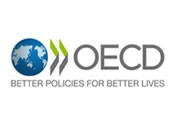Back | Latest news overview
OECD Endorses Quality of IMOA Molybdate Technical Data
18/06/2014

The technical quality of IMOA’s dataset about molybdate effects in the environment and on human health has recently been recognised by the OECD with the award of Mutual Acceptance of Data (MAD) status.
MAD status is a data quality endorsement, awarded by the OECD’s Cooperative Chemicals Assessment Program (COCAM) after a comprehensive technical review by an independent panel of scientists from OECD member countries.
The molybdate dataset will now be used as the key reference point for the development or review of any environmental or human health legislation concerning molybdenum in the 34 OECD member countries around the world. Some non-OECD countries such as Brazil and India adhere to COCAM MAD outcomes and others automatically accept OECD MAD datasets and hazard conclusions into their chemicals management legislation. Applications for this data include risk assessment, regulatory compliance, environmental quality standard setting and mine development impact assessments.
Originally developed to register molybdenum substances under the EU’s REACH Regulation that seeks to achieve safer management and handling of chemicals (including metals), the dataset uses highly soluble molybdenum compounds to generate and assess molybdate effects. High solubility is a worst-case scenario that generates precautionary results. Precautionary data is the calibre most acceptable to the regulatory community which is a major user of this type of data.
Sandra Carey of IMOA’s Health, Safety and Environment Committee said: “The COCAM process is effectively an independent scientific audit. We are very pleased to have achieved MAD status, not only because it is a data quality endorsement, but also because it significantly enhances the global relevance and utility of the dataset. IMOA is the first metal commodity association to secure MAD status for its REACH-submitted dataset.”
The data is now publicly available on the OECD website. The OECD download is called a SIAP (SIDS Initial Assessment Profile), which is a 15-page overview document containing the key data and hazard conclusions in the molybdate effects dataset.
General information for media
IMOA is a non profit trade association, representing the majority of the molybdenum industry worldwide. It works to raise awareness about the unique properties of molybdenum, its beneficial effects on materials performance, its safety in use and its contribution to sustainable development.
Molybdenum is added to alloy steels to improve strength, toughness, hardenability and weldability for numerous applications in the automotive, shipbuilding, construction, mining, chemical, oil & gas and energy generation industries. In stainless steels and superalloys, it improves corrosion resistance and high-temperature performance and finds uses in many industrial applications. It is also used in a variety of products from catalysts and lubricants to pigments and paint.
IMOA has a strict antitrust compliance policy which delegates of all meetings are required to observe. All such meetings are observed by legal counsel.
For more information please email the communications team at media@imoa.info.
For up-to-date information please follow IMOA on Twitter and LinkedIn.
Back | Latest news overview

